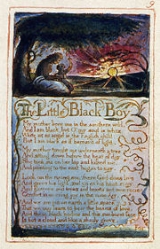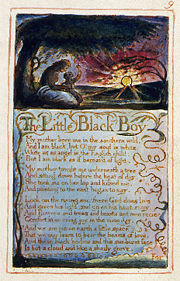
The Little Black Boy
Encyclopedia

William Blake
William Blake was an English poet, painter, and printmaker. Largely unrecognised during his lifetime, Blake is now considered a seminal figure in the history of both the poetry and visual arts of the Romantic Age...
published in Songs of Innocence in 1789. It was published during a time when slavery was still legal and the campaign for the abolition
Abolitionism
Abolitionism is a movement to end slavery.In western Europe and the Americas abolitionism was a movement to end the slave trade and set slaves free. At the behest of Dominican priest Bartolomé de las Casas who was shocked at the treatment of natives in the New World, Spain enacted the first...
of slavery was still young.
Analysis of the Poem
Blake believed in equality for all men, and this is reflected in this poem. It may not be immediately obvious that this is the case, as the narrative in the first stanza plays upon the traditional stereotypes of "black" and "white", black being the color that denotes evil and sin, - "black, as if beareav'd of light" - and white being the color that denotes innocence and purity.It becomes clear over the course of the poem, however, that Blake had a deeper message to convey to his reader. "The Little Black Boy" was published in 1789, a time when slavery was still legal and the campaign for the abolition of slavery was still young. In "The Little Black Boy", Blake questions conventions of the time with basic Christian ideals. This becomes apparent in the third stanza, where Blake uses the sun as a metaphor for God and His Kingdom: "Look on the rising sun: there God does live,". This line is particularly important, as the reference to the sun not only introduces the running religious metaphor in the subsequent stanzas, but the fact that it is "rising" denotes change.
In accordance with the running metaphor of the sun, the fact that Blake speaks of "black bodies" and a "sunburnt face" in the fourth stanza seems to imply that black people are near God as a result of their suffering – for one can only become dark and sunburned as a result of being exposed to the sun's rays. In the final stanza this idea is developed further, as the black boy says that he will "shade him [the English boy] from the heat", this implies that the English boy's pale skin is not used to the heat (derived from God's love) – some critics assert that the paleness of the English boy in this poem is symbolic of the fact that the English were distanced from God as a result of their treatment of the black peoples.
In the 5th stanza, we see all of humanity being united:
For when our souls have learn'd the heat to bear,
The cloud will vanish...
In the 6th stanza this metaphor is continued:
When I from black and he from white cloud free,
Here, Blake uses the clouds as a metaphor for the human body. These stanzas therefore imply that after physical life has passed, all will be united with God.
Also notable in this poem is Blake's use of politically neutral colours such as gold and silver when describing things of moral value. The most valuable things in life, in terms of spirituality and wisdom are anointed with colours that are indifferent to race and social class, yet are related to financial status, as gold and silver evoke images of precious metals.

